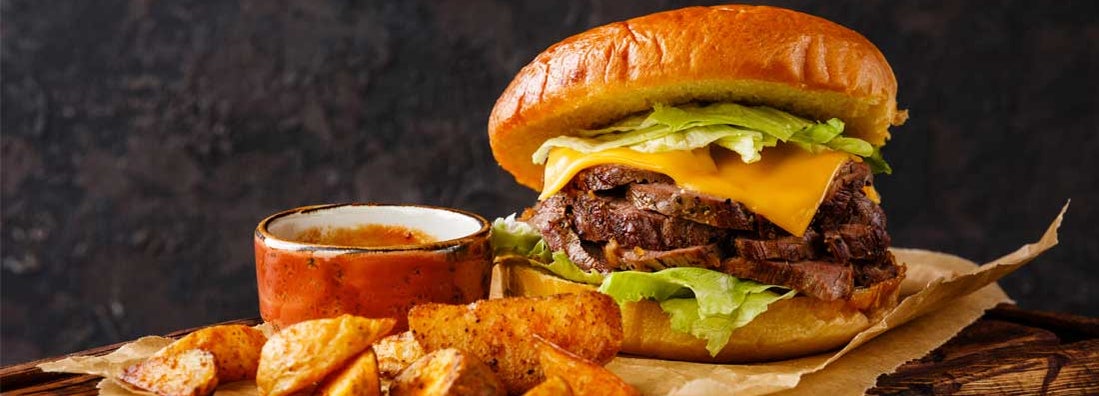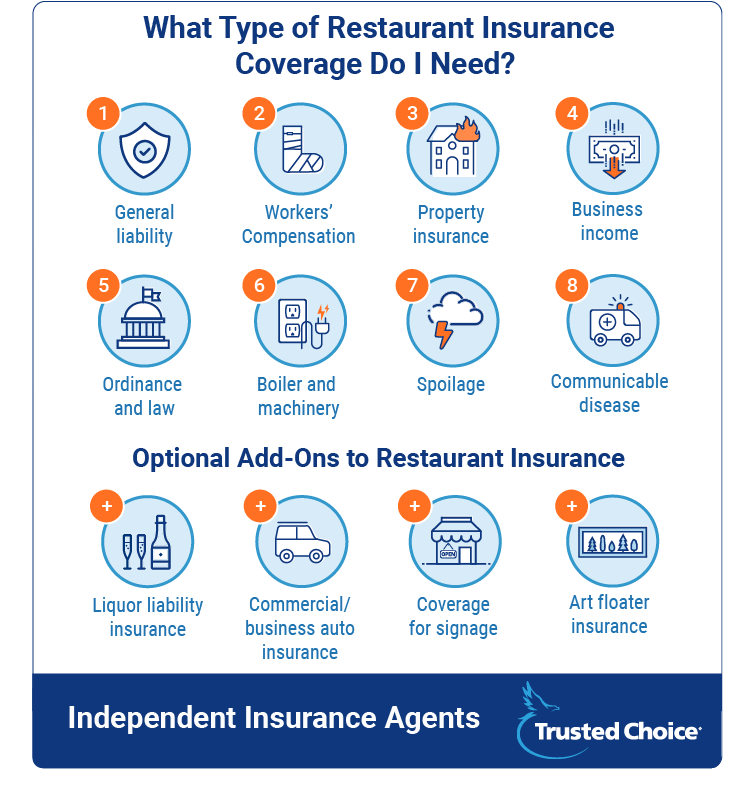Utah Restaurant Insurance
Because things can get tricky at such high elevations) *ALT: (We'll get your restaurant elevated, to match your current altitude.

Paul Martin is the Director of Education and Development for Myron Steves, one of the largest, most respected insurance wholesalers in the southern U.S.

You've got the perfect location, the right menu, and the dream, so now is the time to open your own restaurant in Utah. But before you fire up those fryers, you'll need to equip your business with the proper coverage. In addition to the safety of the public, you'll also need to care for the safety of your employees, as well as your business itself.
That's why it's so important to learn all about restaurant insurance. Our independent insurance agents are here to break down all kinds of restaurant insurance in Utah, from the coverage needed by pastrami burger joints all the way to Chinese food buffets. Whatever your culinary vision, they'll help find the right flavor of coverage for you, at a price that works. But first. . .
What Is Restaurant Insurance?
In short, restaurant insurance is a policy designed to cover all the components involved in your restaurant, from your property and supplies to your employees and customers. Obviously, serving food to the public ties directly into concerns about protecting their health, but restaurant operation comes with many different risks that are important to consider before setting up shop.
What Types of Coverage Does My Utah Restaurant Need?
Before we take a look at some specifics that apply to restaurant owners in The Beehive State, we'll check out the basic coverage requirements across the map. A typical restaurant insurance policy includes the following:
- General liability: This protects you against lawsuits related to injury or property damage done by the business, and it's mandatory. Food poisoning claims would fall under this category.
- Workers' compensation: If your employees become ill, get injured or die from a work-related incident, this aspect of the insurance will cover the financial ramifications. Coverage is mandatory in Utah, as well as in most other states.
- Property insurance: This covers any damage to the physical building that houses your restaurant, in case of fire, etc. The type of cooking equipment your establishment uses will contribute to the risk of fire damage, and may influence the cost of your policy. Businesses with deep fryers that use grease, for example, are considered a higher risk.
Note: Restaurants with a drive-thru will have extra property that needs coverage, and paved surfaces (like driveways) are not typically covered by general property insurance. - Business income: A part of property insurance, this aspect covers the financial loss suffered while a business is closed due to fire damage or other disasters.
- Ordinance and law: Another part of property insurance, it covers the financial ramifications if your building is found to not be up to current state codes. This coverage also applies in the event that you need to rebuild your restaurant, or if you're building one from the ground up, yourself. Handicapped-compliant features, fire safety equipment, and emergency exits are all factors, here.
- Boiler & machinery: Also known as "equipment insurance," it covers electric equipment in the building (e.g., AC units and boilers) that break down due to power surges, etc. Property insurance may cover this stuff, but not always.
- Spoilage: This takes care of the replacement costs for food that spoils due to power outages caused by storms, surges, etc.
- Communicable disease: Covers any illnesses transmitted to customers due to improper hygiene of your employees.
Optional Add-Ons to Restaurant Insurance in Utah
While the basic restaurant insurance package is a great start, truth be told, it might not meet all of your unique needs. Your independent insurance agent will hook you up with the additional coverage that's right for you, but until then, we'll look over some of the most common add-ons:
- Commercial/business auto insurance: If you run a carry-out restaurant that makes deliveries, this coverage can provide protection for your company vehicles from things like theft and vandalism. Your restaurant will also be held responsible for damage done by your driver while in a company vehicle. Food trucks will also need this coverage.
- Coverage for signage: This coverage protects your signage from things like weather and vandalism since it's not typically covered under regular property insurance. It's especially important for restaurants with a drive-thru, with all the extra signage that could be damaged due to distracted or impaired drivers, or vandalism.
- Art floater insurance: This option exists mainly for bigger/fancier restaurants with artwork on display. Scheduling an appraisal for the specific pieces you want to cover is the first required step. In case of fire or even theft, this coverage can help prevent having to pay for the replacements out of pocket.
- Liquor liability insurance: While not mandatory, this coverage can fill in some important gaps. General liability will not protect you if your employees overserve a customer who ends up with a DUI or other alcohol-related charge. This coverage is more necessary for smaller restaurants since chains tend to have stricter serving rules and training policies in place to prevent mishaps.

How Do Utah's Dram Shop Laws Influence My Coverage Needs?
Dram shop laws hold a business liable for serving alcohol to minors, as well as for harm caused by an individual who has been overserved by that business — even after they leave your establishment. A state's specific laws and set of associated penalties/fines for violating them can influence your liquor liability coverage needs and the cost of your coverage. In Utah, as well as many other states, a guest who injures themself due to overintoxication may not sue the establishment, since it's considered the guest's personal responsibility to monitor how much they consume. So liability coverage for first-party cases is mainly only required in a situation when a minor is served since minors are not legally allowed to drink in any state.
However, third-party liability coverage is crucial. If another individual is harmed by an intoxicated guest, such as in a bar fight or auto accident, they may sue your establishment. For these cases, the third party will need proof that the intoxicated guest continued to be intentionally served past the point of visible intoxication by your restaurant. Lawsuits can seriously cost you or your business, in the form of significant financial penalties, loss of employment or liquor license, or even jail sentences. Your agent will set you up with the proper liquor liability coverage based on Utah's unique laws. They'll also explain the costs associated with each level of coverage.
Earthquakes May Affect Your Coverage Needs in Utah
Earthquakes can shake things up in Utah, and they often do. As of recent years, at least 169 earthquakes have been reported in the state over the past month alone, and 621 had occurred over the past year. Having coverage for your restaurant could help to keep things steady. Though your restaurant insurance policy will most likely cover disasters sparked by earthquakes (such as a pipe bursting in the aftermath), it most likely won't cover damage to your restaurant's foundation or merchandise.
Restaurant owners in an earthquake-prone zone have all the more incentive to seriously consider adding earthquake protection to their policy. Talk with your agent about your risk to determine if you should add more coverage. They'll know exactly the right amount of coverage to set you up with, to avoid you having to pay out of pocket for potential damage down the road.
Blizzards/Flooding May Increase Your Coverage Needs, Too
Though Utah's known to have a particularly dry climate, that doesn't stop it from seeing some harsh winters. Blizzards can dump several feet of snow, which will eventually melt once that desert heat starts to creep back up. Worse yet, once all that snow melts, the runoff just might find itself a new home. . . inside your restaurant. Luckily, flood insurance can help.
If your restaurant is located in an area deemed to be high-risk (or even if it isn't, in certain cases), you may be required to have flood insurance. Flood insurance will cover your property (the structure of your restaurant and the merchandise inside) if natural water (i.e., rain, waves, snowmelt, etc.) wreaks havoc. Once again, if you're unsure whether you have it/need it, talk with your agent. They'll help make sure you're covered, to help save you from having to clean up Mother Nature's mess on your own.
How Much Does Restaurant Insurance Cost in Utah?
It depends on what kind of restaurant you run and a few other factors, such as if you've got employees, offer a delivery service, operate a drive-thru or serve liquor. However, a typical range for coverage starts at the low end of about $10,000/year for a smaller establishment with fewer employees and hits the high end of more than $100,000/year for a much larger restaurant, like a chain. A restaurant insurance policy is typically the cheapest and easiest way to go. This package offers most of the liability and property coverage you'll need, and you can always add on specifics as necessary. Your independent insurance agent will know exactly what to hook you up with.
What's the Safest/Cheapest Kind of Restaurant I Can Start?
Obviously, smaller is going to be cheaper. A food truck or corner stand downtown will be by far the cheapest option since there won't be as many sales as in a larger chain, there aren't any other employees (that would require workers' comp), and you won't be serving alcohol. Coverage costs would most likely be in the low thousands each year.
What's the Most Expensive/Riskiest Kind of Restaurant I Can Start?
On the other end of the spectrum, a large dine-in restaurant chain with tons of employees and features like salad bars, buffets, and liquor bars is by far the priciest/riskiest venture. All the required workers' comp, property, and liability insurance drive up costs exponentially. It ultimately depends on lots of specifics like the number of employees and the value of the property, of course, but we're talking big numbers, like more than $100,000 per year.
What's So Great About an Independent Insurance Agent?
Insurance policies are often filled with lots of technical jargon. Additionally, it's a real process to hunt for the right policy. Fortunately, sifting through the available options and pinpointing the necessary coverage is a task that can easily be handed off to someone else. That's where independent insurance agents come in to save the day. Independent insurance agents will not only help you get the best possible deal, but also the type of coverage that's right for you. They shop and compare insurance quotes for you, and even break down all that complex jargon into plain old English, so you understand exactly what you're getting.
Finding/Comparing Restaurant Insurance Quotes in Utah
Our wise and helpful agents will help you determine which types of coverage make the most sense for you. They'll also compare policies and quotes from several different insurance companies to make sure they're setting you up with protection that's among the best around. In other words, they'll make it happen.
ncsl.org
alcohol.org
dui.findlaw.com
servsafe.com
earthquaketrack.com
